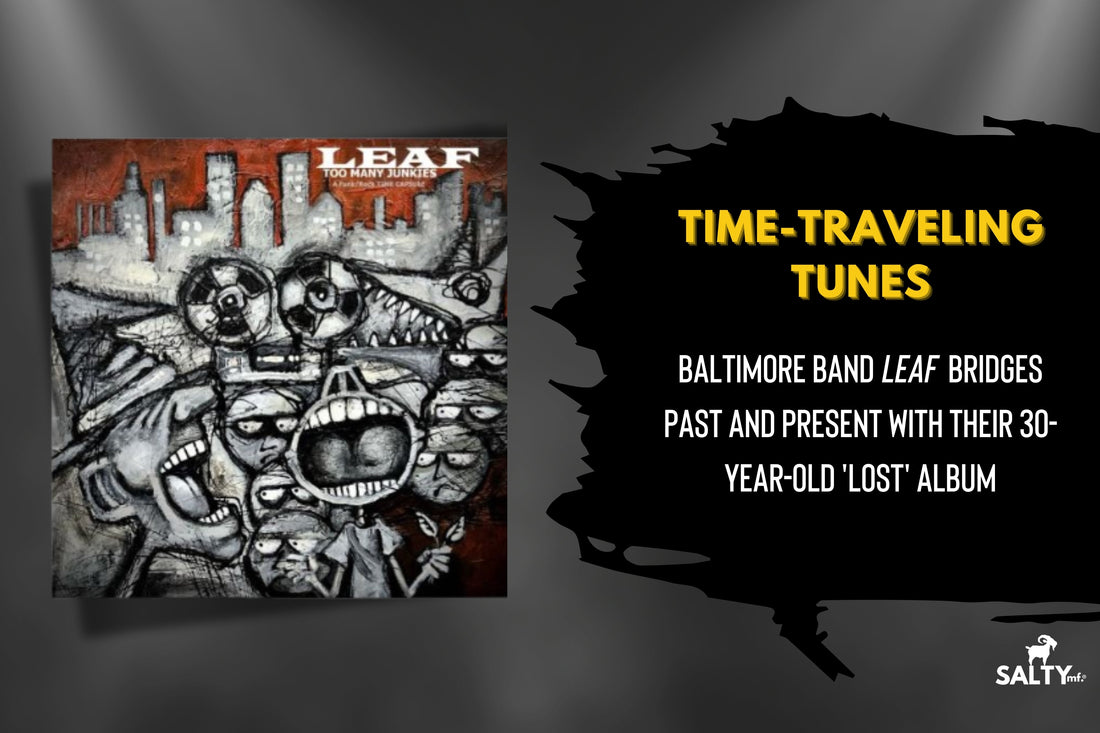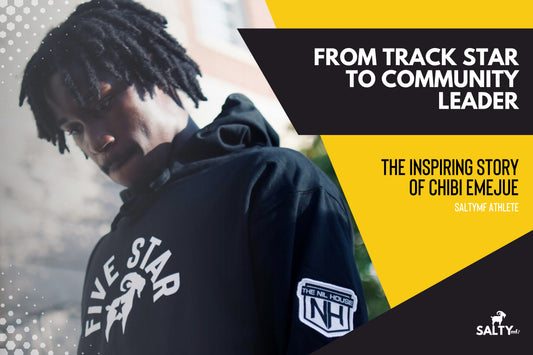
Time-Traveling Tunes: LEAF Bridges Past and Present with Their 30-Year-Old 'Lost' Album
In music, some stories are too wild, too unbelievable, to be true. This proves to be the case for the band LEAF. Formed by brothers Billie and Joe Senger, this band's story is about more than just music. It is a riveting history of creativity, hardships, and celebration.
This post takes us back, recounting the history of the Baltimore-based band whose lost album, "Too Many Junkies," was rediscovered and released nearly three decades after it was recorded. Journey with us as we navigate their musical experiences, the hurdles they encountered, the recording process of the lost album, and how a tragic death caused the album to go missing for nearly two decades.
Billie Senger & the Baltimore Music Scene
Growing up in 1960s Baltimore, mental health issues loomed large over Billie's early life. He grappled with conditions such as manic depression and bipolar disorder, which were poorly understood during his formative years. These challenges often manifested as impulsive actions and mischievous behavior that left those around him struggling to understand how to help.
As a result of his struggles, Billie found himself bouncing around alternative schools and foster homes starting at a young age. These experiences exposed him to a variety of environments, each with its own set of rules and expectations, but for Billie, they often felt like temporary pit stops on the road to nowhere.
It was during this troublesome time that one of Billie's foster parents introduced him to a world that would change the course of his life forever. This foster parent, with a passion for music, handed him a guitar- a simple gesture that would spark a profound transformation in Billie. With the guitar in hand, Billie found himself captivated by his connection to the instrument. It created an invaluable outlet to channel his emotions, express his creativity, and escape the chaos that had defined much of his youth.
At the time, Baltimore was a city alive with musical innovation. The cultural mix of Baltimore's neighborhoods played a pivotal role in shaping the city's sound. The blending of African American, Irish, Jewish, and Italian communities created a unique fusion of influences that could be heard in the music's rhythm and felt in its soul.
For Billie, this was a world brimming with inspiration and opportunity, setting the stage for his musical journey. The groove of funk, the improvisational nature of jazz, and the fast times of rock all melded into a unique sound that was unmistakably his own.
From Basement Jams to Timeless Tracks
By the time he turned 18, Billie was fully submerged in the Baltimore music scene. He had learned how to play several more instruments and joined a band, all before moving back into the family home with music gear in tow. It was safe to say that Billie found his passion, and as a matter of fact, he was a damn good musician.
Shortly after moving back in, Billie converted the basement into his band’s rehearsal studio. Here, he and his bandmates were constantly jamming out. Little brother Joe listened in as the sounds reverberated throughout the house. This was Joe’s introduction to Billie’s world, and it pulled him in. Joe would spend hours listening to his brother's records, immersing himself in the sounds of legends like The Rolling Stones and John Lennon. Through Billie's tastefully curated record collection, Joe learned to appreciate the diversity and richness of music, developing his own taste and style along the way.
Most of the time, when the band wasn’t rehearsing, their instruments sat idle in the basement. Every so often, when Billie wasn’t home, Joe would slip down to the basement and play the band’s instruments. Joe, gifted with the same natural sense of rhythm that his older brother possessed, gravitated to the drum set. He continued to practice on the drummer’s equipment for some time, doing his best not to get caught.
Joe was still young though, just a teenager, occupied by the typical activities of an adolescent such as school and sport. He observed closely, though, as his brother shuffled through a couple more bands, dissatisfied with his experiences in each of them.
Cultivating LEAF’s Distinct Sound
One day, Billie returned home to find Joe pattering away on the drum set he had been scolded for playing so many times before. Currently fed up with his bandmates, Billie acknowledged his little brother’s growing talent on the drums. With full control in mind, Billie proposed a deal with his little brother that if he bought him his own drums he had to join his new band.
It was here, in 1979, as 14-year-old Joe was pounding away on his brand new set of Ludwig’s, that the story of LEAF began.
It started out as just the two of them, covering hit tracks of the past and present. Joe, of course, played the drums. Billie, on the other hand, wore several hats. He sang lead vocals while hopping back and forth between several different instruments to round out their sound. Their home became an epicenter of creative energy and funky late-night jams, drawing in a diverse crowd from across Baltimore.
The early days of the band were all about legendary house parties that united the neighborhood behind one thing: groove. It was at these parties that LEAF's signature sound started to crystallize, fueled by the spontaneous energy and multicultural influences that congregated in that cramped basement. The euphoric nights cemented their belief that LEAF had a vibe worth sharing with a broader audience.
By 1991, the buzz generated from their basement sessions prompted them to take their music to the next level. With the help of a 4-track recorder, the brothers successfully recorded LEAF’s first original record, "Food Stamps / How Do I Know," in late 1982. The 45 RPM record was two-sided, similar to the band who recorded it, and included a rock side and a funk side for listeners to enjoy. We will hear more about this record’s modern resurgence later on.
The makeshift studio where they recorded—a patchwork of cables and equipment—was as eclectic as the music they made. The two continued to record music with the help of various local musicians throughout the rest of the 80s into the 90s.
The Cultural Background That Shaped “Too Many Junkies”
Now, let’s pause and look back a bit. The late 80s and early 90s were wild times in America. Communities across the country were strained by the persistence of cultural movements, with media and art reflecting the tension that simmered just beneath the surface.
America's War on Drugs, which reached its height in the 1980s, exacerbated racial disparities, leading to increased incarceration rates and fractured families, particularly in urban areas. Ironically, this period was also ravaged by the crack epidemic. This only added fuel to the fire, as neighborhoods were consumed by addiction and violence, leaving lasting trauma in their wake.
The LA Riots in ‘92 served as a flashpoint, reflecting deep-seated racial tensions and a demand for justice and equality. Against this turbulent backdrop, movements like hip-hop and socially conscious rock flourished, providing a voice to the marginalized and pushing back against systemic oppression.
LEAF’s debut album, "Too Many Junkies," sought to capture both the fun of party life and the harsh realities of the era. This project was more than just a musical endeavor for the group; it served as a spotlight, shining a glaring light on the stark contrasts of the time. Each member brought their own personal experiences and influences to the table, constructing a powerful message that delivered the raw emotions and societal commentary they wanted to convey. Their objective was clear: to produce music that was not only entertaining, but provocative enough to grow awareness around the issues tearing apart our communities. With the addition of Byron Bowen, a bass player who could lay down some serious funk, work on the album began.
LEAF - Dooms Day
In the years leading up to recording “Too Many Junkies,” Billie DIY’d a full basement renovation, installing a fully equipped home studio for the band to record in. He was always a pretty handy fella. They would even record the drums and guitars on different levels of the house to achieve more optimal sound separation. Pretty damn smart.
Here, LEAF curated a sonic sanctuary where they could produce their timeless music. This upgraded setup opened the floodgates on new creative possibilities, and a shiny new Tascam 388 8-track recorder allowed the band to layer sounds more intricately and express their evolving style more imaginatively.
Hardships, Addiction, and Strained Relationships
The band recorded tirelessly throughout the early 90s. Unfortunately, though, as the album was nearing completion, personal struggles, drama, and lifestyle differences began to fracture the band. Billie was not always a man known for his indulgence in alcohol. Maybe a few cold beers when rehearsing with the boys, but that was about it. Once he started on the rum, though, things changed. This increasing consumption, a misguided attempt to medicate his bipolar disorder, led to a tumultuous series of events that slowly killed production on the album.
Being the frontman of the group, Billie was essential to the entire recording and editing process. The family home, passed down to Billie by his parents, was once teeming with the soulful energy of Baltimore's grooviest folks. Unfortunately, though, after failing to pay property taxes, the heirloom was seized by the county. This was a significant blow, as the basement that housed Billie’s DIY recording studio was now in the hands of the local government.
Consequently, Billie moved into an apartment in downtown Baltimore, where his drinking continued to plague him. Years before, his little brother Joe relocated to York, PA, some 50 miles away, in search of a better environment for raising a family. Despite the ongoing tension and added distance, the trio continued to record sporadically into 1995, with a plan to release the album by the end of that year.
Obviously, the release never happened.
The intimacy of collaboration cultivated within those basement walls was fragmented, and somewhere among the Baltimore city landscape, Billie's mental health and spirit further deteriorated. The lack of a stable recording space limited his expressive outlet and the band's ability to work cohesively. Their sense of momentum had vanished, and the project now felt stalled in the shadow of Billie's demons, reflecting how deeply personal challenges can intertwine with and disrupt artistic pursuits.
As time continued on, his physical and mental condition worsened. He periodically suffered from bouts of extreme paranoia and depression. Even a triple bypass surgery and stern medical advice to sober up was no match for his fierce alcoholism. Joe continued with new music projects of his own, always employing his brother Billie to play lead guitar when recording. He titled his first record “Stranded Max,” signifying the loss and lack of direction Joe was experiencing after the band dissolved.
Through the many ups and downs, Joe’s love for his brother never wavered. He attempted to guide Billie towards redemption, imploring him to seek help, to salvage his life from the shackles of addiction, and to start taking his medications. But, similar to the efforts of the doctors, these words fell on deaf ears.
Eventually, Joe relocated once more, this time for work, to Jacksonville, FL, and their brotherly band sessions flickered out. The two talked off and on after Joe moved, sometimes months between each conversation. At the start, these were positive experiences, but as time passed Billie’s mental state continued to worsen, and their talks became dominated by Billie’s episodes of psychosis.
Then, abruptly, there was nothing—just silence. Initially, this didn’t set off any alarms for Joe. But when weeks turned into months and every ring was met with the cold monotone of a disconnected phone, worry settled in.
“Is he okay? Is he locked up?” Joe pondered the possibilities.
The Loss & Recovery of Billie's Musical Legacy
By late summer of 2006, deciding he could no longer put off his growing concerns, Joe booked a flight to Baltimore to visit his brother and make sure everything was okay. When he landed in Baltimore, he made a beeline for Billie’s apartment.
Upon arriving, the apartment seemed to be in a questionable state. The windows were wide open, something an increasingly paranoid Billie would have never done. Moreover, the apartment had been completely emptied and there was no trace of Billie whatsoever.
Now this was definitely cause for concern. Perplexed, Joe visited the shop next door to see if he could find out any information on his brothers’ whereabouts. The store owner delivered the tragic news. She told him that Billie had passed away months earlier, in April. The lady explained that after a few weeks without seeing Billie around, the landlord broke into his apartment and found him. She also mentioned that the landlord cleaned out his apartment shortly afterward.
Joe nearly choked as he gasped in disbelief.
LEAF - Without You
“Four months ago? Broke in?” Joe thought to himself. The details chattered inside his head, as he continued to try and unravel the news he just received. It was as if the ground had shifted beneath his feet, leaving him struggling to find balance amid the rush of emotions.
How could this have happened without him knowing?
Why did nobody contact him as the next of kin?
More importantly, where is his brother?!
After several phone calls with local authorities, Joe was able to claim Billie’s remains just in time. Now starting to reflect a little, Joe realized he had developed an anger and distrust towards the systems and people that carelessly brushed aside his brother's life as insignificant. I mean really, why has this process gone so poorly? The police report he obtained shows that there was no mention of “next of kin” at the scene. Why would the landlord omit this from his statement? Could this be the same reason that he never reached out to Joe directly either?
After all, It's not like he was unaware that Billie had a brother. Joe and the landlord had met on several occasions in the past. It became increasingly clear that the landlord, likely in an attempt to recover past due rent, had sold what he could of Billie’s things and then carelessly tossed the rest in the dumpster. Joe began to remember the valuable items that must have been in Billie’s apartment when he passed.
A rare guitar collection, presumably worth 10s of thousands, complete with Les Pauls, Explorers, and Fender Stratocasters. Gone.
Remember that fancy home studio he built in the basement of the family home? Well, he didn’t leave all of the equipment there when he moved out. Thousands of dollars in recording gear. Gone.
His extensive Lionel model train collection. Gone.
Hundreds, if not thousands of vinyl records, Billie’s lifetime collection of music. Gone.
And by far the most upsetting loss, LEAF’s original music, including their original recordings of an unfinished album called “Too Many Junkies,” as well as their completed records. All of them. Gone.
The material possessions—Billie's instruments and items like his model trains—while deeply cherished, were just things. Joe knew that his bond with Billie was much more than could be encapsulated in any object, however beloved.
It was the original LEAF tapes and records that were going to leave a gnarly scar on Joe's heart. These weren't just vinyl and tapes; they were the embodiment of Joe and Billie's creative partnership. The music they contained held memories of midnight jams, innovative breakthroughs, and lively studio sessions. Joe's anguish was palpable, as he grappled with the reality of potentially never recovering the many tapes and records now missing.
But rather than ruminating in it, Joe channeled his grief into a fierce determination. He wanted to preserve his brother's artistic soul and to mend his own heart, piece by piece, by recovering what he could of Billie’s belongings. Before returning to Florida, Joe and his sister took legal action, opening a civil case against the landlord for selling Billie's property and failing to contact next of kin.
While the case began to play out, Joe also set out to see if he could find where the missing items ended up. Remember, this is late 2006. Online shopping was around, but certainly not in its heyday yet. If the landlord sold some of Billie's stuff, it was likely that he sold it locally. In September of that year, Joe submitted a letter to the Maryland Musician Magazine, hoping that someone might be able to give him a lead. They published his BOLO-style letter a month or two later.
Now is probably a good time to introduce Ian Nagoski, local musician and co-owner of True Vine Record Shop located in the heart of Baltimore. Ian is in the midst of a typical day when a customer walks into his shop. You know the type—plenty of bling, talking on speaker phone, carrying an attitude to match. He had at least a dozen boxes of records in his trunk and a lame spiel about a “dead uncle.” The story seemed a tad flimsy, but hey, who can resist a potential treasure trove of vinyl? Money exchanged hands, the dude left, and Ian began to sift through the boxes.
Immediately, he realized that the collection shouted of a younger man's tastes—George Clinton and John Lennon dominating the mix. Surely not the picks of a man from an older generation. Ian continued sorting through the pile. Most of it wasn't worth much but nestled among the stacks were some local 45s from an unknown band called LEAF. Now, that was something intriguing!
Lost Record "Food Stamps" Sparks Global Interest
Ian’s curiosity led him to play the mysterious records. The long breakbeat intro on a two-sided record named "Food Stamps" immediately caught Ian's ear—wah-wah guitar with a funky, infectious rhythm. It was raw, unpolished, and irresistibly groovy. He knew the track’s intoxicating breaks and underground origins would excite niche DJs and crate diggers alike. He began to dial up local collectors to share this newfound gem. Within hours, local enthusiasts flocked to hear the obscure record. The verdict was unanimous- ”Food Stamps” was gold.
LEAF - Food Stamps
Many questions remained, though. No one had heard of LEAF, nor did any records of their sales exist. It was a diamond buried in Baltimore’s rich musical soil, waiting to be uncovered. With each play, the record’s allure grew. Ian began selling copies of “Food Stamps” at modest prices, but demand quickly spiked. In no time, these records were being resold for hefty sums, up to $250 a piece, and gaining attention far beyond the local scene.
At some point, Joe Vaccarino came into the shop. Vaccarino is the author of Baltimore Sounds, a book that highlights impactful local musicians from LEAF's era. When Ian mentioned the LEAF records he was sitting on, Vaccarino was intrigued. He was unaware of any LEAF contributions to the Baltimore music scene but recognized their potential place in Maryland’s musical tapestry. Ian offered Vaccarino the master tapes for archival purposes, a nod to preserving Baltimore’s music heritage, but he merely listened to them and then left empty-handed.
Months later, Vaccarino alerted Ian to the article Joe wrote in a local music magazine penned by Joe Senger, LEAF's drummer. Joe sought information on his late brother Billie’s music gear and record collection, which was stolen and sold off by his landlord. Ian quickly realized he had found the owner of the mystery tapes. He wrote Joe an email, offering a master reel and copies of all the 7-inch records that he possessed.
Joe's response to this unexpected outreach was one of relief and gratitude. After an exchange of emails, the two agreed to meet at True Vine, conveniently on the same day Joe was scheduled to appear in court for their case against the landlord.
Upon returning, Joe and his family faced a significant hurdle in the courtroom- documentation, or rather, the lack of it. Without receipts or serial numbers to prove ownership, their case against the landlord was iffy at best. The family had been hopeful that the court would see the injustice of the situation, but the absence of proof meant that their claims about Billie's property wouldn't hold up legally- case dismissed.
The trip to Baltimore wasn't all bad, though. Joe visited the record shop a few hours after leaving the courthouse, and Ian came through on his promise. He returned the master reel and various other records; they visited for a short time afterward. Joe shared a little about his brother Billie, who led the creative vision of LEAF’s music and the records Ian and others were taking an interest in. The two went their separate ways, and Joe returned home to Florida, lost tapes in hand.
While all of this was unfolding, a copy of the brothers’ record “Food Stamps” had made its way across the Atlantic, likely facilitated through a sale on True Vine’s eBay. It was loved so much that English DJ, “Mr. Thing,” included the “Funk” side on a breaks comp CD called "Strange Breaks and Mr. Thing,” released in 2008 by BBE Records.
Just before the CD was released, in 2007, an English record dealer and DJ contacted Ian in an attempt to reach Joe Senger, who likely had some royalties to collect from BBE. It was this that prompted Ian to detail his entire experience from start to finish in True Vine’s email newsletter, which we referenced when recounting his experience. Ian’s story was later picked up and published by the Baltimore Sun and can be read in full here.
The resurgence and widespread support of LEAF’s “Food Stamps” motivated Joe to get his hands on the recordings of their unfinished “Too Many Junkies” album. He took to Craigslist, posting an ad seeking anyone in the Baltimore area who may have purchased something of Billie’s that might have contained the album. Some time passed, but eventually, he did get a response back from a guy in Baltimore who bought some of Billie’s recording equipment. While the guy didn’t want to let go of the Tascam 388 that he found some of the reels in, he did want Joe to have their original recordings. Joe could have cared less about the recorder, and he flew back up to Baltimore. They met in a bar in Towson, where they had an exchange so brief Joe didn't even catch the guy’s name.
Resurrecting LEAF’s Old Records
With the 30-year-old tapes finally in his possession, Joe hesitated to listen to them. Playing the tapes in their original condition risked permanent damage, an outcome he couldn’t bear. Regular life took back over, though. And the project got put on the back burner. The tapes sat in one of Joe’s closets for years, until he finally decided “it was time” to bring them back to life in 2023. He shipped the recordings to the guys at The Tape Farm, a professional restoration service outside of Nashville that specializes in bringing old tapes back to life.
Restoring old tape recordings involves techniques like "tape-baking" and "tape transfers," which sound more like culinary terms than technical jargon. Tape-baking is a technique used to temporarily stabilize old magnetic tapes that have become sticky over time. Following this, tape transfers convert the stabilized analog recordings into digital formats, preserving the sound for future generations. This delicate process requires specialized equipment and a deep understanding of audio technology.
Finally, the moment arrived for Joe to listen to the restored recordings. A warmth of nostalgia washed over him as he pressed play, each note a time capsule transporting him back to that basement studio. The familiar riffs and rhythms triggered an emotional whirlwind—euphoria, gratitude, and a touch of pride for what he and his brother created together. Tracks Joe had once forgotten resurfaced, alongside ones he had never heard and some that were left unfinished. It was as if his brother Billy was right there, playing along, sharing the moment with Billie.
'Too Many Junkies': A Funk Rock Time Capsule
For Joe, "Too Many Junkies" now stood for far more than what it had; it was now a group of tracks that highlighted the musical influence and talents of his older brother. In honoring Billie's legacy, Joe set out to complete and release the album, motivated by its timeless sounds and still-pressing social commentary. He sees it as a tribute to his brother's vision and a nod to the enduring power of music to unite people and inspire change.
The next step in this journey was the remastering process, a meticulous endeavor that requires patience and expertise. Joe brought in Rick Grice of Endangered Wise Men Studio in Jacksonville, Florida for mixing and mastering to ensure that the essence of LEAF's original recordings were preserved. Rick's extensive background in sound engineering helped him to skillfully refine the sound, enhance clarity, balance the different elements of each track, and prepare the album for a new generation of listeners. To bring in new instruments and layers, Joe brought fellow musicians to the studio to record, enriching the album's sonic palette without overshadowing its roots.
Among the unfinished tracks, "Trouble," an instrumental recording, took on deep emotional significance. Joe decided to complete it, composing heartfelt lyrics that paid tribute to his brother and their times together. This final touch was a celebration of their bond, a musical conversation between siblings, and marked the completion of the 30-year-old album.
LEAF - Trouble
Joe offers a compelling vision for those who listen to "Too Many Junkies." He hopes the album will transport listeners to a world both familiar and new—a place where past and present intertwine. With lyrics that speak to social issues and melodies that evoke a euphoric response, the album is a reminder that while times change, the messages baked into life seem to stay the same.
Love yourself. Love others. And enjoy every moment.
As we wrap up this story, LEAF continues to revive theirs. A chance for Joe to finally say, "Here is what we created." Their album, "Too Many Junkies," was released on all platforms on October 1st, 2024, and is also available for purchase on Joe’s website.
A “funk rock time capsule” that speaks to social issues, race relations, and the complexities of life, It's bold, it's brash, and it's exactly what you need to break out of the ordinary. With its release, Joe honors Billie's legacy, sharing with the world the sounds that once echoed from their home on Belair Road.
Available on all streaming platforms, this is your chance to be one of the first to tap into a musical journey that echoes the raw energy of the late 90s Baltimore music scene. So, grab your headphones, hit play, and let the beats of LEAF transport you. We’ll leave the links down below.
Stream "Too Many Junkies"
Purchase a Hard Copy
Scoop up one of the limited vinyl copies here
Read More About Leaf
Funky Cheese Pie





1 comment
Great job on the blog “Dawson Jones” – you captured and told the story perfectly!
drummer/Song writer/producer – leaf